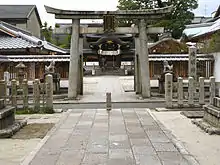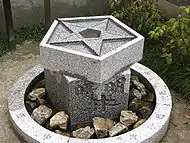| Seimei Shrine 晴明神社 | |
|---|---|
 Torii gate at entrance to Seimei Shrine | |
| Religion | |
| Affiliation | Shinto |
| Deity | Abe no Seimei |
| Location | |
| Location | 806 Ichijō-agaru, Horikawa-dōri, Kamigyō-ku, Kyōto-shi, Kyōto-ken 〒 602-8222 |
 Shown within Japan | |
| Geographic coordinates | 35°01′40″N 135°45′04″E / 35.02778°N 135.75111°E |
| Architecture | |
| Founder | Emperor Ichijō |
| Date established | 1007 |
| Website | |
| www | |
Seimei Shrine (晴明神社, Seimei-jinja) is a Shinto shrine that is located in Kyoto, Japan. It is dedicated to the onmyōji, Abe no Seimei.
History
The Seimei Shrine was founded on the 4th year of the Kankō era (1007) by Emperor Ichijō, who ordered the shrine built in memory of Abe no Seimei, after his death in 1005. It was constructed on the site of Abe no Seimei's house.
The main building was restored in 1925.
Architecture

Two torii gates lead up to the entrance of the shrine.
A famous well (Seimei-i) is located on the shrine grounds, and the water drawn from it is considered somewhat magical. Tea master Sen no Rikyū was known to have brewed tea with the water from this well.

The pentacle, known locally as a Seimei-star, is an important symbol found on many parts of the shrine. Abe no Seimei reputedly came up with the arcane insignia in the 10th century, symbolizing the Five Chinese Elements. Japanese bellflower (Platycodon grandiflorus) ornamentation are found in decorative tiles and lanterns. The five petal tips of the flower are thought to represent the same ideal as the pentagram.
A nearby bridge, the Ichijō Modori-bashi is situated just south of the shrine, and is held to be a gateway between the human and spiritual realms.
Festivals
Seimei Matsuri (晴明祭) is held every year on the Autumnal equinox.
Images
 Torii with pentacle
Torii with pentacle Stone lion
Stone lion Stone komainu
Stone komainu
 Front shrine
Front shrine Peach bust
Peach bust Kusu-no-ki, a sacred tree
Kusu-no-ki, a sacred tree Stone tablet for Sen no Rikyū
Stone tablet for Sen no Rikyū
See also
References
External links
- Official Site (Japanese)